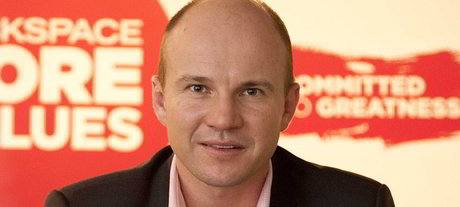Creating competitive advantage through curiosity
By Angus Dorney, Senior Director and GM, Rackspace ANZ
Wednesday, 02 December, 2015

Curiosity is about learning, exploring and investigating the world around us. In business this also translates — it’s about opportunity and challenges, ensuring businesses thrive and prosper.
Curiosity plays an important role in both our personal and professional potential. The two are intrinsically linked — how we behave personally is translated into our professional persona.
At Rackspace, our research has shown that most businesses don’t place too much emphasis on curiosity as a business enabler — it’s likely just a ‘nice to have’.
Yet, it’s the one thing most directly responsible for starting a business in the first place.
Inevitably as a business prospers, practices become established and curiosity — that desire to ‘wonder’ — falls off the radar. We become shackled by legacy systems and the way that things should be ‘done’.
It’s little wonder really, when curiosity is such an intangible and often unknown quality.
We undertook a survey of 1368 white-collar workers in Australia and New Zealand and found that curiosity plays a hugely important role in personal and professional lives, with respondents identifying that it has helped them achieve great things in both.
One of the most interesting aspects identified in the study was the role of technology, not only as an enabler of curiosity, but a potential barrier too.
Respondents cited ‘shackled by old systems and processes’ as the third most popular barrier. But while it can be a barrier, technology has a big role to play in enabling an organisation’s ‘curiosity quotient’.
The importance of curiosity
Dr Tomas Chamorro-Premuzic, a leading authority in personality profiling and psychometric testing, outlined in the Harvard Business Review three key psychological qualities that enhance our ability to manage complexity — intelligence quotient (IQ), emotional quotient (EQ) and curiosity quotient (CQ).
Dr Chamorro-Prezumic says that while IQ is something that tends to sit naturally within us, or not as the case might be, both EQ and CQ can be coached and developed. He argues that the CQ plays just as an important role when managing complexity.
CQ has not been as deeply studied as EQ and IQ; hence Rackspace’s desire to prove that it is just as, if not more, important in dealing with the complexities of today’s fast-paced organisations.
What makes curiosity?
We developed the Rackspace Curiosity Quotient to help Australian and New Zealand organisations understand the curiosity values most important both to them and their employees; values that ultimately help drive revenue, growth and job satisfaction among employees.
Rackspace enlisted the help of corporate anthropologist Michael Henderson to help define the values that define Curiosity — the values that form our CQ. He believes there is a direct link between human values and the experience of being ‘curious’.
Michael identified 11 human values that act as a stimulant to initiate the drive or inclination of Curiosity:
- Creative ideation
- Discovery and insight
- Education/knowledge
- Pioneerism/progress
- Research/original knowledge
- Search/meaning
- Self-actualisation
- Wisdom
- Wonder/curiosity
- Communal discernment
- Design/pattern/order
The Rackspace Curiosity Quotient focused on three core areas:
- Individual, personal curiosity
- Professional curiosity
- Organisational curiosity
These three ‘personas’ formed the basis for understanding the appetite for curiosity and the gaps that might exist.
Each of these personas was then ranked against one another, as well as correlated against factors such as revenue and growth, job satisfaction and technology to understand where an organisation’s CQ gap exists.
What we found
We found that of the 44% of respondents who believed their organisation was curious, 77% agreed curiosity played an important role towards innovating new products and services. That number drops dramatically to just 36% in non-curious organisations.
Similarly, in curious organisations, 85% of respondents agreed that it is essential to be curious about technology and its application in the workplace, compared to 57% in non-curious organisations.
Of the overall respondents surveyed:
- 80% said it was important to be curious in life generally.
- 73% agreed it was important to be curious within their day-to-day job.
- 63% strongly agreed that curiosity played an important role in driving increased revenues in the business.
- 70% agreed it was essential to be “curious about technology and its application in the workplace”.
- 67% agreed that “technology had enabled a greater level of professional potential for them at work”.
Sixty-five per cent of respondents agreed it was important to switch off from technology, “enabling periods of thinking and quiet” time. Yet only 37% surveyed said their workplace encouraged time away from technology for day-to-day contemplation.
How to map your CQ
The major finding from the study is that the curiosity drivers people feel organisations prioritise are not aligned with what people themselves deem as important, or which can help drive revenue, growth and job satisfaction.
Organisations need to explore the values that drive curiosity from deep within their employees, as well as the values the organisation overall deems important. Businesses can use the 11 human values outlined to start to develop their own CQs.
Once we understand the values and their importance from both an employee and organisational perspective, the values can be mapped against one another to understand alignments and gaps.
Using these variables as a benchmark can help both organisations and employees to understand what is important and where to focus priorities — and even where efforts shouldn’t be focused — to find common ground on the drivers of curiosity.
Why AI's longevity lies in utility, not novelty
The real potential of AI is in underpinning the invisible systems powering everyday business.
The importance of effective security when deploying AI tools
More than four in five developers use AI coding tools daily or weekly, and 59% run at least three...
Five IT trends that will define 2026: building a smarter, more resilient digital enterprise
The coming year will bring an intelligent, automated and highly distributed IT ecosystem grounded...







